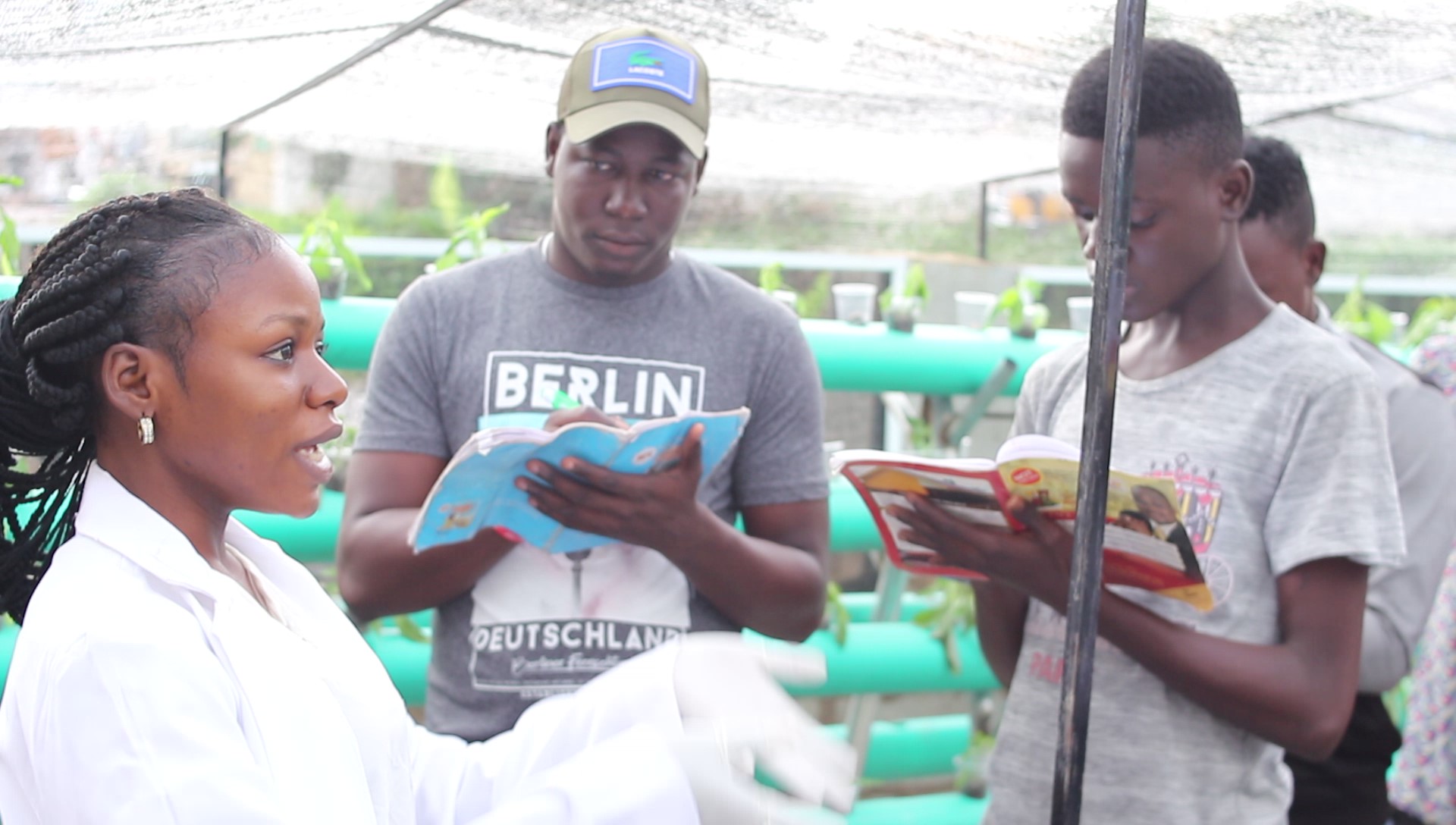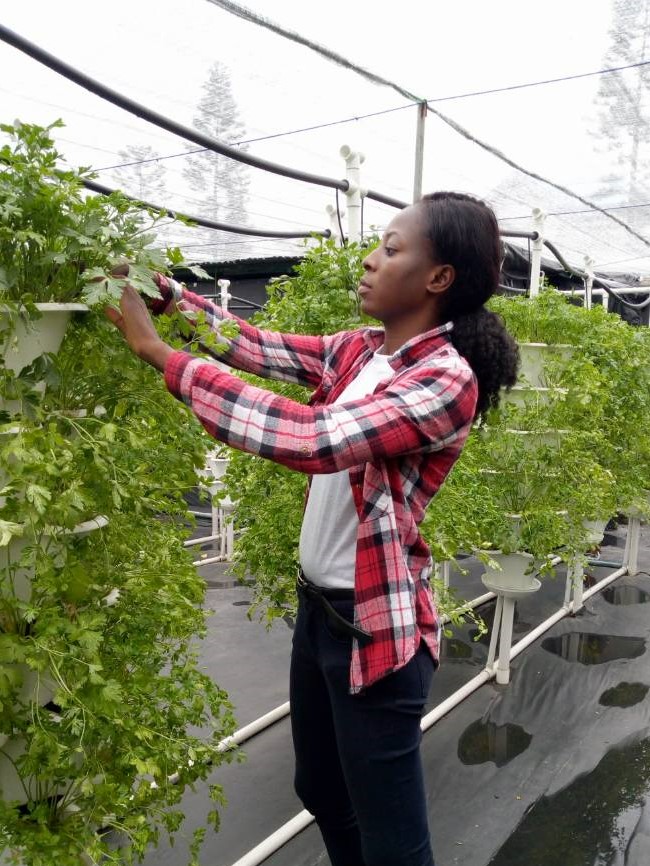Empowering Women in Agriculture: Nigerian Company uses Hydroponics to Revolutionize Food Growth and Distribution
Nigerian enterprise Soupah Kitchen & Company is one of 15 winners of the 2021 African Youth Adaptation (YouthADAPT) Solutions Challenge. In an interview with GCA, Soupah’s CEO and Founder Ms. Ifeoluwa Olatayo shares how YouthADAPT has made her feel empowered and led her to expand her company.
P
rojections show that parts of Nigeria are at risk of extreme heatwaves that impact the country’s water resources and agricultural systems.
Soupah Kitchen & Grocery Technology Company is a women-led agro-producer and distributor based in Ibadan, Nigeria, that aims to change the way food is grown and distributed in this climate-vulnerable country. This enterprise leverages special techniques, known as controlled-environment agricultural practices and resource-smart growing technology, to manage the conditions in which food is grown.
The company reduces the impact of weather conditions on the production and transportation of food in the community by growing vegetables such as lettuce, kale, leafy greens, and herbs using hydroponics, which means they grow the vegetables without using soil.

Soupah Kitchen & Company is one of 15 winners of the first African Youth Adaptation (YouthADAPT) Solutions Challenge, an annual competition launched in 2021 by the Global Center on Adaptation (GCA), the African Development Bank (AfDB), and Climate Investment Funds (CIF) as part of the Africa Adaptation Acceleration Program (AAAP).
The AAAP is also building the enabling environment to scale up support for adaptation solutions and grow the ecosystem of investors and innovators to create jobs and livelihoods in adaptation through initiatives such as YouthADAPT. YouthADAPT is an annual competition that aims to empower young Africans by supporting their adaptation solutions and entrepreneurial spirit.
In a ceremony at COP26, GCA announced the competition’s first 15 YouthADAPT Challenge winners who were awarded a US $100,000 grant to expand their solutions and business support through a 12-month accelerator program. Female-led businesses represented more than 50 percent of winners, including Ms. Ifeoluwa Olatayo, CEO and Founder of Soupah Kitchen & Company.
In an interview with GCA, Ms. Olatayo describes what being a YouthADAPT Challenge winner has meant for her business and on a personal level.
What are your solutions to tackle climate-related challenges that affect your community, particularly youth?
Over 70 percent of the Nigerian population are involved in agriculture, and Nigeria is still practicing rain-fed agriculture which renders her vulnerable to the adverse effects of climate change. Extreme weather events such as flooding, heat waves, and drought lead to low crop yields, or in some cases, complete loss of crops. This discourages youth from participating. Research carried out in some parts of the country shows that only 22 percent of youth are willing to participate in agriculture.
This is why I came up with Soupah Kitchen & Company. Our solution allows youth to take up farming with little to no risk of suffering climate change impacts while significantly increasing their profits.
Soupah Kitchen & Company is changing the way food is grown and distributed by leveraging controlled environment agricultural practices and resource-smart growing technologies to plant food.
We use hydroponics to plant vegetables such as lettuce, kale, leafy greens and herbs. We innovatively operate this farm from the rooftop of a building within the city of Ibadan. We then harvest and sell our vegetables to customers at affordable prices, and also process them into healthy and nutritious ready-to-eat meals, juices and tea.

What changes have you observed as a result of your solution?
Our solution has increased agricultural productivity and reduced malnutrition.
By building resilience, our resource-smart growing technology is designed to grow up to 3 tons of fresh food within a 650 square-meter area, an area that is slightly smaller than an American football field. With Controlled Environment Agricultural practices, we can harvest year-round.
Our well-maximized space and vertically grown vegetables are sold at $1.3 per kilogram, so with a 1600kg cultivating capacity of a 26-day cycle, we can make at least $2095 on a farm of 650 square-meter within 3.5 weeks. These high-quality foods produced at commercial-scale and in an ecologically sustainable way are sold to customers in their freshest, most ‘nutrient-dense’ forms within the shortest delivery time.
Also, our climate-smart farm is part of a modern approach to environment-friendly agriculture, attracting the interest of youth by empowering, training and mentoring them.
How does Soupah Kitchen & Company contribute to the community and to climate adaptation?
Our farm, unlike traditional farming, requires less resources, sustainably planting with 95% less water, no machinery, no new land, no harmful fertilizers, and with a growing process that produces up to 30% greater yieldsand two times faster. For some herbs and leafy greens, the seedling-to-harvest cycle can be as short as 21 days, with higher resilience and without the need to grapple with the consequences of abnormal rainfall and floods that can destroy crops.
By localizing production, our rooftop farm significantly cuts down the amount of fossil fuels needed to produce and transport food, while also reducing the need for the use of excess and harmful packaging materials. By farming on rooftops, we enhance the urban landscape and provide more green spaces that contribute to healthy urban ecosystems. With supply chains strained during the Covid-19 pandemic, our farm presented how urban agriculture rises to serve urban populations during crises.
What led you to apply to the YouthADAPT challenge last year?
I applied to the YouthADAPT challenge because I believed the opportunity would help me to scale my business from just being a lifestyle to being a legacy. I wanted to meaningfully engage myself with the community that will make my enterprise’s expansion plan achievable.
My desire is to expand our solution and increase our impact, and to achieve this, I saw the YouthADAPT platform as an opportunity to attain valuable media attention and technical support for business growth. I also hoped to get a tremendous platform to network and foster collaboration with other brilliant African founders, as well as use the funding to sufficiently scale my business operation.
I must say that I am more than delighted that I applied. I have been getting my inspiration, education and mentorship needed to scale.

How has YouthADAPT helped your business?
With the YouthADAPT opportunity, my enterprise has been funded with $100,000. This funding has been enormously helpful, and the investment made thus far in our implementation plan has had a demonstrable impact in strengthening our climate-conscious mission. With the training, I have further been exposed to the best financing options needed to scale our impact and mentored through investment readiness. Having a rare opportunity to get trained on more sustainable ways of growing my social enterprise will go a long way to help us overcome future funding obstacles.
What benefits did you personally derive from the YouthADAPT mentoring program?
Knowledge! I feel empowered to grow my business and achieve set goals from the training and the advisory sessions that my mentoring program takes me through.
With the YouthADAPT mentoring program, I have started building up that circle of professionals that will give me the social capital that my business needs. Having a mentor show me the ropes gives me room to attain success without having to learn everything from the start and at the expense of time.
I am also able to expand my network and acquire new skills – in this case, it is blockchain expertise, among other skills.
How did you use the resources received from the program?
At Soupah Kitchen & Company, we are building a food system that unlocks nutrition for everyone, while protecting our environment. The YouthADAPT funds have, so far, helped us achieve significant growth.
Our previous production capacity was at 0.6 ton per cycle, but the funds have helped us to increase our production capacity seven times over. We can now automate some of our processes and achieve four tons per production cycle.
By the end of our accelerator program, this award will also help us to be able to implement our long-awaited franchising model with blockchain technology for transparency. Our additional farms will be demonstration centers for women and youth to acquire skills training for green jobs, empowering communities to lead a sustainable lifestyle.
What are the next steps for you? What are your hopes and ambitions?
Within the next year, we aspire to have built and franchised 100 hydroponics farms and impacted over 300 young people with licensed farms. Our objective is to help over 20,000 consumers to shift their lifestyles to more healthy food options by reducing food prices by 25 percent, increasing the affordability and accessibility of fresh foods.
With our anticipated growth, we aim to use our objectives and key results to solve deeper problems with our kitchen-as-a-service company, which offers “foodpreneurs” the opportunity to expand their business, while reducing waste and energy consumption.
Additionally, our expansion plan aims to use blockchain-enabled technology to run a franchising model to replicate our business in many African countries and scale massively.
The AAAP is an Africa-owned, Africa-led initiative launched jointly by GCA and the AfDB with the support of the African Union and African leaders. The AAAP is mobilizing US $25 billion for adaptation investments in Africa in the next five years. GCA’s AAAP Upstream Financing Facility is mainstreaming the best climate adaptation science and solutions into programs across Africa. In its first year of operation, the Upstream Financing Facility has influenced more than $3.5 billion in downstream investments with Multilateral Development Banks in 19 countries across Africa.